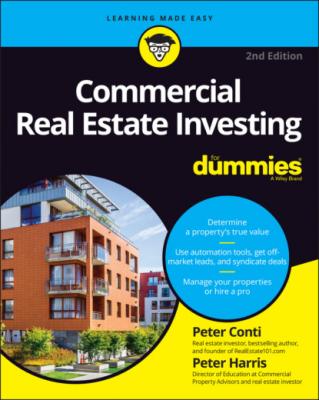ТОП просматриваемых книг сайта:
Commercial Real Estate Investing For Dummies. Peter Harris
Читать онлайн.Название Commercial Real Estate Investing For Dummies
Год выпуска 0
isbn 9781119858515
Автор произведения Peter Harris
Жанр Недвижимость
Издательство John Wiley & Sons Limited
Step two — analyzing properties
Step two is to analyze those properties so you know how much they’re worth. You’ll need to determine your target price for each property so you can get them at a wholesale price or terms. The problem for most beginning commercial real estate investors is that they learn the cap rate formula but they don’t realize that sellers (and brokers) almost always lie about the, expenses for the property.
Step three — getting it under contract
If you are going to wholesale commercial properties, you’ll need to get the property under contract. This gives you control of the property because the seller can’t do a deal with someone else after they’ve signed a contract with you.
Getting the property under contract gives you something of value to sell when you wholesale the property. We see rookie wholesalers sometimes try to wholesale a property they don’t have under contract. You need to get the property under contract for two big reasons.
Getting it under contract — reason # 1
First off, there’s little to no value in saying, “Hey, I found a great deal, but no I don’t have it under contract.” Getting the seller to agree to sell at a wholesale price is what makes the deal work. The signed contract that you have is the written proof that you’ve “done the work” to get an attractive price on the property. Authors.
If you don’t have a contract, it’s pretty clear that no one is going to want to deal with you. Yet, every week while working with my mentoring clients, we run across rookie wholesalers who think they can wholesale a property they don’t have under contract.
Getting it under contract — reason # 2
The second reason is a big one. For a wholesale transaction to be legal when you are operating without a real estate license, the property needs to be under contract.
In all 50 states, you can’t bring together a buyer and a seller without a real estate license. However, when you have the property under contract, then by law, you can assign your contract to a buyer and receive money at closing.
You must, just to be extra clear here, have the property under contract. Got it? Some people claim that without a real estate license you can put a buyer and seller together and get a “consulting” fee. You’ll probably even see some investors doing this. That doesn’t make it legal.
Step four — finding a buyer
A ton of buyers are out there for good apartment deals. Not surprisingly, there’s going to be very few or no buyers for a lousy deal. You’ll discover this very quickly if you agree to pay too much for a property. As a wholesaler, you need to be able to give your buyers a deal with some meat on the bone. This usually mean that your buyer’s price needs to be below the actual value.
This makes sense, especially when you consider the rookie wholesaler who gets a property under contract for 95 percent of value. As soon as this newbie tacks on their five or ten percent wholesaling fee, they are now competing with thousands of other properties that are listed by professional commercial brokers. These brokers are good at marketing and presenting properties. On top of this, the brokers usually have a listing with a longer time period to find a buyer than the time that a wholesaler has to move a property.
We know we’re driving this point home here. Make sure that you have enough equity in the deal to be able to add your wholesaling fee while still giving your buyer a great deal. This means that your buyer is able to purchase the property below its actual value, or in some cases below the proforma value. This would apply to a property you’ve found with rents that are well below market rates, as one example.
You’ll want to make sure that you are able to qualify your buyer. Just because a buyer comes back after looking at your deal and is willing to sign your assignment agreement, doesn't mean that they are actually going to be able to close on the deal. If you don’t qualify your buyers correctly, this could ruin your deal and adversely affect your reputation. You’ll want to make sure you understand what your buyer’s needs are and make sure they can perform.

